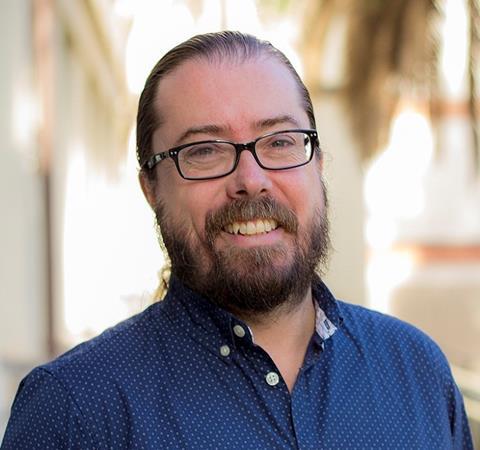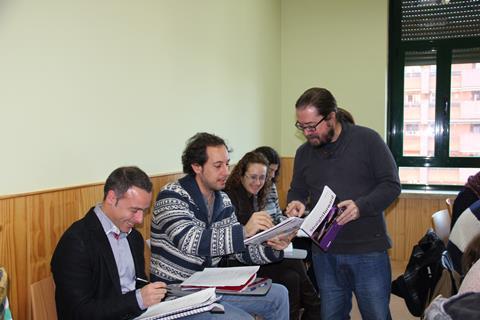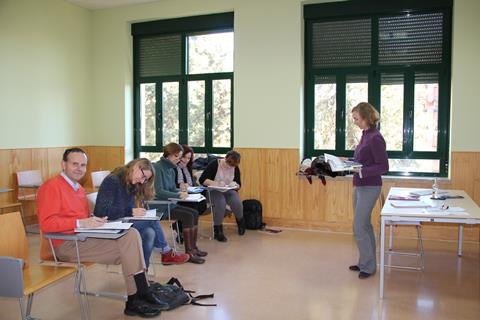Teachers from Instituto de Lenguas Modernas, Extremadura, Spain, have impressed us with some great winning entries to the onestopenglish Lesson Share competition. We talk to Director of Studies and lesson share winner Troy Nahumko about his school, how his teachers became involved in the Lesson Share competition, and the benefits his teachers get from onestopenglish.
Instituto de Lenguas Modernas and the lesson share competition
Tell us a bit about yourself. How did you get into teaching? How long have you been a Director of Studies? And most importantly, what do you enjoy about teaching?
For me teaching has always been a natural extension of one of my first loves, travel. The problem with travel is that you usually find yourself a spectator, looking from the outside in on to different cultures. Whereas when you stop and teach for a spell, your contact with the people and the culture is much deeper and more rewarding. I took my CELTA in Madrid and from Spain moved on to working at a Cambridge Exam Preparation centre in Sana’a, Yemen when the British Council pulled out of the country during the second Gulf War. I then gained some experience teaching in the oil industry in Baku, Azerbaijan, where I learned a lot about developing niche intensive courses for clients like BP. From there I became involved with IELTS in Vientiane, Laos. I then worked in Ghaddafi’s Libya, teaching within the Ministry of Tourism in conjunction with Northumbria University and finally came full circle back to Spain. I was offered the chance to help start up the modern languages branch of the University of Extremadura as DOS and jumped at the chance and we’re now in our fifth year.
From our academic position, we are working on changing the way languages are taught in the region and taking the modern aspect of our name seriously. We keep our focus on language production and the actual use of the language as opposed to the more traditional grammar-gap fill approaches that have been the teaching norm in these parts. My time working with IELTS has had a big influence on me and our way of focusing on the teaching of skills is having a knock on effect on the way English is being taught in schools at all levels around Extremadura. As many of our students are teachers themselves and need our certificates for official purposes, our shift away from more traditional grammar testing is influencing them and helping other teachers make the same migration. Our recent status as a Cambridge Testing centre has also helped raise awareness of the need to teach the language as a whole and this facet of our business seems to have a bright future.
 Director of Studies, Troy Nahumko
Director of Studies, Troy Nahumko
Tell us a bit about the Instituto de Lenguas Modernas de la Universidad de Extremadura.
As the modern languages branch of the University of Extremadura, we offer classes in many different languages; Chinese, Portuguese, German, French, Italian, Arabic, national languages like Galician and even Sign Language. That said, English makes up the bulk of our classes. We have eight centres around the region and have up to sixty teachers, both local and foreign, teaching over three thousand students. One of the biggest challenges we face is making sure that all of the teachers are working together on the same page, as we strive to offer the same service at each centre. We also find ourselves in one of the lesser known regions of the country, and a region without access to the sea at that. This means that we don’t have the large number of native speakers moving through the area that other places in Spain might have. This has its pro’s and con’s. At times we have difficulties finding qualified native speakers but the teachers that we do have tend to stay with us for a long time. We offer a variety of general English and exam focused courses throughout the year and we are somewhat unique in Spain in the sense that we are a centre that does not work with children.
How and why did you and your staff first decide to get involved in the lesson share competition?
Part of our CPD program consists of a weekly online discussion group. It serves as a platform to keep in touch with all of our teachers across the eight centres as it is impossible to get us all together for regular meetings. I think of it as a very large teachers’ room. Every week we look at various aspects of teaching and for the past six months I have been encouraging our staff to send in their best lesson plans and ideas and test them against the world.
How has the experience of winning lesson share helped you and your teachers?
I think that it has been extremely encouraging. Often teachers, especially newer ones, think that their ideas are somehow less valid than those of the so-called gurus of TEFL that come ready made in the Teacher’s Book. Being selected for something like this provides teachers with an immense confidence booster and encourages them to experiment further and try out new ideas and approaches. Of course, it also provides a little bit of healthy competition in the teachers’ room. In all, very positive.

What do you and your teachers like most about onestopenglish and how often do they use the site?
I think that every teacher uses it in a different way. We’ve all been in that situation where we feel that our students need an extra look or an extra push in a certain area and often onestopenglish is the first place they look for extra material, be it grammar, vocabulary or even pronunciation. I think that some people think that onestopenglish is simply a collection of lesson plans but I know that some of our teachers use the methodology sections to resolve doubts that they might have.
What benefits have you noticed from using onestopenglish?
Something I often see being projected onto the screens in our classrooms is Adrian Underhill’s interactive phonemic chart that can be found on the site. Mr. Underhill often says that pronunciation is the Cinderella of language teaching and having an easily accessible tool like this brings Cinderella to the ball. Another benefit is that the website exposes teachers to different lesson shapes, which in turn influences the way they plan and develop their own classes. This exposure helps teachers realize that there is a wide world out there beyond the margins of the coursebooks.
Can you tell us a little about your CPD programs and the workshops that take place with Macmillan teacher trainers?
A lot of emphasis is placed on Continuous Professional Development at the ILM and as many of our teachers tend to stay on with us for long periods, we get to see the rewards of this program. After all, our teachers and our teaching is what makes us different. Alongside our weekly discussion group, we work with Macmillan teacher training and provide our staff with a series of methodology workshops every year. We host these in our two biggest centres, Caceres and Badajoz on days that we don’t teach and encourage all our staff to attend. The sessions are great and range from things like specific pronunciation workshops to explorations of things like DOGME and emerging ideas like Demand High teaching. The quality of the sessions is always excellent and this motivates our staff to happily attend. The sessions often act as forums to discuss problems that we are all facing as they are some of the rare times that we are all together in one place at the same time.
What other involvement do you have with Macmillan?
When we were looking at coursebooks we wanted to work with a partner that would work with us to help us get the best possible use out of the product. Macmillan has been very generous from the start by providing training, both with sessions on how the coursebook actually works and the methodology workshops. The better we know how to use the product (coursebook), the better we look and the better Macmillan looks. As teachers know, students are often unaware of all of the tools modern coursebooks can offer them but I think the same can be said of some teachers. Why search for an irregular verb list when you have one on page 124?

Teachers at Instituto de Lenguas Modernas
”Working at the ILM has allowed me to further the perfection of my craft as an educator through continued training courses. These courses bring fresh and exciting ideas for me to use in the classroom, in addition to providing me with new materials and ideas that are constantly molding and changing my teaching philosophy. The ILM is a great place to work due to the variety of educators and students that it attracts. We have students of all ages and professions, something that helps to make each group of students unique. The variety in each group makes for the preparation of each class an exciting, albeit challenging, process.
I use onestopenglish as a supplement to lessons that I write. It is perfect as a resource to add a little bit of flare or to get a fresh aspect on a lesson that you maybe find overdone or that you have since lost passion for. It helps to give you new ideas and to keep your mind sharp. The ILM has a very friendly, amiable working environment that promotes teamwork and support. Not a day passes where we do not use our wide variety of backgrounds and knowledge to help one another and to make headway in the labyrinth that is the English language.”
J. Zachary Mehlhoff, ILM Caceres

”Working at the ILM is first and foremost a pleasure. Of course there are days when time drags, but mostly our classes are active, with our primary focus on speaking. Our students are all teenagers or adults and so discipline is never (or rarely) an issue - we can laugh with them, discuss all kinds of topics and include games and quizzes in our classes. In my time at the ILM, I have learned to relax more when teaching, to improvise in response to what students say and thereby shed my fear of straying from the lesson plan. I have also been made aware of how many opportunities are out there in the world of ELT, with the onestopenglish lesson plan competition being just one example. I am now confident enough to ask ‘what’s next?’”
Lesson share winner Jessica Killaspy, ILM Caceres
“Despite the fact that I had been teaching for quite a long time before beginning at the ILM, working here has been the most important and influential step in my teaching career. From the very first day I realised that the approach that was needed here was completely different from the one I had experienced before. Getting rid of many of the classic and traditional teaching corsets was the first thing to do, and putting into practice all the new things that we were learning was the second. Right now, I don’t think I will ever be able to teach the old way again. Working at the ILM is a gift. We’re constantly recycling ideas, talking, investigating, sharing… innovating. Right now, I don’t think there’s another institution such as ours in Extremadura. onestopenglish is a useful tool to complement my classes. Every time I have doubts on how to approach a topic, I use onestopenglish.”
Encarna Perez Pulido, ILM Caceres
”I have been working here for four years and I can honestly say that my teaching has changed (and it’s still changing!) for the best thanks to the help I receive from my colleagues. I consider onestopenglish as one of my most valuable tools when planning my classes. The amount of resources I always find, the excellent ideas uploaded by other colleagues from around the world and the extremely helpful articles and notes on teaching are priceless for me! At the ILM, native and non-native teachers have created a healthy and cooperative working environment where we all share our ideas, thoughts, tips and even fears and doubts about our teaching and we always have a colleague readily willing to help.”
Marina Gonzalez Vivas, ILM Caceres
“Since I joined the ILM team, I’ve seen motivation as a key part of my work and it is here where onestopenglish plays an important role.”
Maria Luisa Iglesias, ILM Caceres
“Working at the ILM in Plasencia has completely changed my attitude towards teaching English. I have also become more aware of the importance of adapting different learning styles. And the reason of this professional development may have been the challenge of facing highly motivated students in the classroom. We have to bear in mind that students come to the ILM freely and willing to pick up a task many of them gave up some years before disheartened or with a feeling of incompetence in learning a language. On this basis, we find a group of students where motivation is taken for granted, and this, for sure, changes the teacher’s attitude, increasing the level of self-demandingness but also the level of job satisfaction.”
Esther Ramos, ILM Plasencia
“I would like to describe my own experience at the ILM. First of all, I’m glad to have been given such an opportunity. From my viewpoint, working here is both demanding and rewarding. Demanding since it requires to put in hours if I want my classes to be successful and rewarding when you see your students’ improvement and realize that one has something to do with it. However, it’s not only our students’ issue but also a personal one. It’s challenging to do your best when teaching and eagerly look for new methodologies to become a better teacher.”
Silvia Vale, ILM Badajoz
“Working at the ILM has been a truly enriching and unique experience. As a centre dedicated to teaching languages to adults it stands out for both the quality of its methodology (predominately based on materials elaborated by Macmillan) as well as for its innovative mix of solid language learning combined with a constant application of that knowledge by the students. Assimilation and application is the key. In the ILM centre in Badajoz I have had the great pleasure of working alongside some of the most dedicated teachers who always inspire me to keep going onwards and upwards in my development as a teacher and this leads to an ever more positive effect on my students. There is a profound sense of being part of a team here while respecting and learning from each other as individuals. This has been due in great measure to the leadership of the coordinator in Badajoz who (following the guidance of the ILM DOS in Caceres) has known how to meld a really diverse group of teachers into a well-oiled machine while at the same time allowing each teacher the freedom to manage their classes profiting from their own unique talents and skills. No automatons here! onestopenglish has been a great help to me and my pupils. In the main I use the Macmillan Straightforward course in my classes but I often use the activities and lesson plans to complement this learning process. For instance, often on Friday we have to make up classes due to public holidays etc. As some students cannot attend I usually use something different and this is invariably a lesson plan from onestopenglish. The shorter activities I often incorporate into my normal classes in order to consolidate something which has been taught in class.”
Paul Kiel, ILM Badajoz


No comments yet